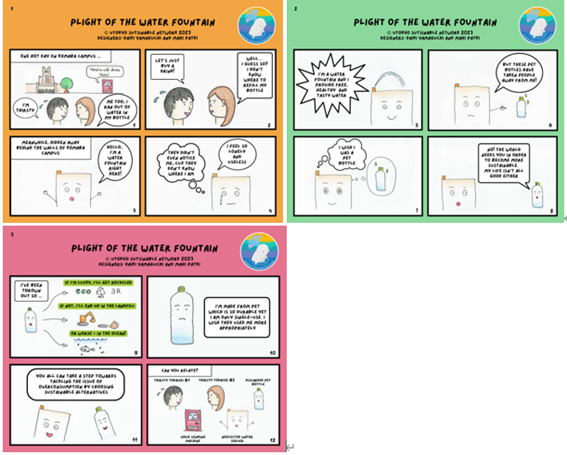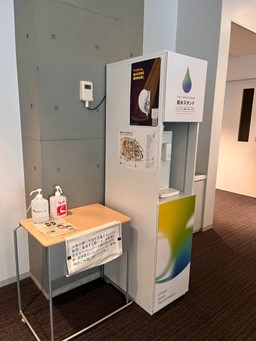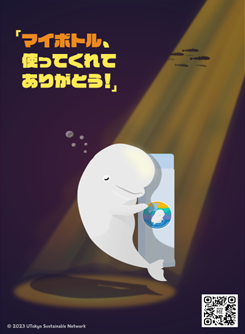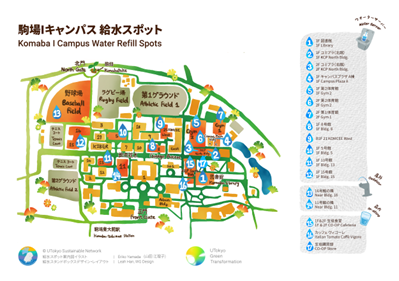Blossoming from GEfIL roots – installing water refill spots on Komaba I Campus
Blossoming from GEfIL roots – installing water refill spots on Komaba I Campus[1]
Mahi Patki, Daiki Yamaguchi [2]
Have you ever wondered where to refill your water bottle on campus? Well, wonder no longer! Persistent student-led activism has managed to achieve what seemed impossible just a few years ago: thirteen and three new water servers have been installed on the Komaba I Campus and Hongo campus, respectively!
1, GEfIL Independent Research Project (IRP) PHASE I
So, how did we get here? We must go back to late 2020, when our team began looking into the issue of plastic waste on University of Tokyo (UTokyo) campuses in the GEfIL IRP PHASE I. In IRP, we were divided into groups and worked on practical solutions to achieve the Sustainable Development Goals (SDGs) in Tokyo. Our team (the 6th generation) (Team 4: Daiki Yamaguchi, Haruka Iketani, Mahi Patki, Rei Fujimoto, Toa Fukushima, assisted by Yuta Osaki (TA) and Pavel Hejcik (mentor)) targeted SDG 12 (Responsible Consumption and Production) and SDG 14 (Life below Water). We were supported by workshops in which we actively learned how to define problems, come up with ideas, and effectively plan and convey research-based proposals. The learning outcomes of GEfIL workshops truly facilitated us in developing the final proposal and gave us the following invaluable three skills.
A. Framing a complex problem and defining a concrete problem
Our team was interested in the issue of overconsumption, particularly the increasing amount of waste resulting from the single-use culture in Japan. We knew that plastic is one of the major single-use products in our daily lives, and that its eventual degradation and accumulation as microplastics further exacerbates environmental pollution.
However, this issue was too broad and involved a variety of problems. For example, plastic waste comes in many forms, such as packaging, fishing equipment, fibers; a target needed to be chosen. Our mentor Professor Hejcik asked us “why are there so many plastic products around us?” Through individual research by team members, we realized that there are essential and non-essential plastics. On the one hand, packages of medical products, for instance, are essential to maintain sterility, and not using plastics to pack meats and fish may increase food waste. On the other hand, there are non-essential plastics such as PET bottles, whose consumption can be reduced. We narrowed down our target to tackling PET bottle consumption at UTokyo Komaba I Campus.
B. Idea generation
Once we defined our problem, the next step was to develop solutions. We learnt many techniques to think of solutions in the ideation workshop of IRP and continued to use it in our regular meetings. It helped us to have a lot of ideas from different perspectives. Through hours of discussions, we reached a decision to propose to install more bottle-refill-type water servers at the Komaba I Campus. Our hypothesis was simple: encouraging students to use their own bottles through these servers could reduce plastic waste, and may be a gateway into the wider adoption of a more environmentally conscious lifestyle.
C. Storytelling
We were taught and encouraged to use the storytelling technique for the final team presentation. Storytelling is the method of conveying the story of a persona (or personas), in order to describe problems and develop empathy towards stakeholders impacted by our proposal. We incorporated the method at the beginning of our presentation by telling the story depicted in the comic strip (Figure 1). This introduction managed to engage our peers in GEfIL, and everyone seemed to like our ideas, but also provided critical feedback. We received a lot of advice from Prof. Hejcik and TA Yuta when preparing for the presentation[3]. For instance, we learned how to effectively construct the presentation and design slides, which helped us later in this project when presenting at high-stake meetings.
What we found with our primary research during IRP in Komaba was not surprising: usage of water bottles was low, and awareness of refill locations was nearly non-existent. In 2021 the Komaba I Campus had over sixty-four buildings but only ten drinking water fountains for over 9000 students and staff members. Our surveys revealed that many students were unsure about whether water from these refill locations was safe to consume. Respondents were also unsatisfied with the water’s taste, and the unhygienic appearance of the servers themselves. Coupled with a pandemic that only amplified hygiene-related concerns, which led to shiyoukinshi (“Use Prohibited”) signs being plastered on the few servers that did exist, what you have got is a perfect recipe for an exacerbated single-use culture on campus.
2, Beyond GEfIL
After the IRP final presentation, Professor Guo (GEfIL mentor) asked us to make a 3-page proposal about our project so that it could be submitted to a Vice President in UTokyo. Furthermore, GEfIL Teaching Assistant Leah Han attended the final presentation and introduced us to the Todai Sustainable Campus Project (TSCP) student committee where Akari Nomura had suggested a similar initiative. This highlighted the importance of collaboration and communication between the fragmented student groups on campus. Eventually, members of the environmental circles ECHO, Kankyo Sanshiro, TSCP student committee also joined our small but burgeoning initiative, thus leading to the launch of “P0001 Water Server” as the pioneer project for the UTokyo Sustainable Network (UTSN)[4].
To begin implementation, we started to investigate who was (or would be) responsible for installing and maintaining the existing (and new) water servers on campus. We emailed anybody and everybody who seemed mildly related, yet to no avail — as it turns out, management of the servers did not quite fit into anyone’s job description. The next challenge is how to obtain the statistics to make our proposal convincing. The Co-op store provided us with data on the sales of bottled beverages in 2019, and we continued by gathering student opinions and preferences on the project. We scoured every floor of every building on campus to identify potential refill locations, and wrote a research-based 45-page proposal in Japanese.
We then presented at the student dialogues held by the various interrelated UTokyo initiatives, such as the Center for Global Commons and Race to Zero in 2021. An opportunity eventually arose to deliver a 4-minute pre-recorded presentation at the Future Society Initiative (FSI) Advisory Board meeting in November 2021[5], where the President of UTokyo himself praised our project. The GEfIL mentors provided critical feedback when preparing for this 4-minute presentation. Our spirits were at an all-time high after this meeting, yet no action followed from the university’s side. So, we decided to change strategies and approached the Komaba Jichikai (Student Union), suggested to us by Professor Itatsu (GEfIL mentor), and it was added to the Komaba Jichikai negotiations agenda.
Almost a year later in October 2022, UTSN (somewhat miraculously) received an email from Professor Masahiro Sugiyama notifying us that the university has launched the Green Transformations (GX) Student Initiative team and would like to have an informal meeting with the UTSN water server team. Apparently, UTokyo Executive Vice President Tatsuya Okubo pressed to realize this project. In this meeting with GX and administrative staff, held in November 2022, we discussed the list of potential water server installation locations. In January 2023, we met with Mr. Kazuyuki Akita from GX and a representative from a company called “Water Stand” to discuss further details of the installation. After what seemed to be glacial progress, finally, thirteen water servers were installed at locations 1 to 12 and 17 (see Map 1) by April 2023 (Figure 2)!
3, Beyond Installation
We continue to ask ourselves: is this initiative the most sustainable solution? Water servers, after all, have their own carbon footprint. However, to compete with vending machines and konbinis, we need water servers that provide cold tasty water. When it comes to technological fixes like this, it is easy for us to fall into the trap of assuming that complex problems can be solved by techno-scientific interventions alone.
With this project, we are trying to change the culture of superfluously buying sugary and caffeinated beverages in single-use plastics, which is detrimental to both human and environmental health. Some critical steps to follow are raising awareness of the locations of water servers, promoting the use of reusable bottles, and educating about plastic pollution.
In March 2023, Co-op wanted to start selling Komaba-themed reusable bottles in collaboration with UTSN. Moreover, UTSN is planning a Sustainability week in June 2023, where we hope to host a bottle design competition among students, and a scavenger hunt to raise awareness of the water server locations with an educational quiz about the issue of plastic waste. Furthermore, we want to work in collaboration with Toyo University and Ochanomizu University as they seek to realize a similar project in their respective universities. We look forward to finding out what methods will be most effective and discovering what it takes to spark behavioral change.
To ensure that the university will continue to fund the project and expand it to other UTokyo campuses, the impact of the servers must be monitored. This includes quantifying water consumption through the attached water meters, analyzing the change in beverage sales at the Co-op store and vending machines, and gathering student feedback. In our (somewhat controversial) opinion, once there are sufficient water servers across all campuses, we could even nudge the university to reduce the number of beverage vending machines. Maybe then, everyone will be less tempted to buy into the lure created by polluting, unethical, and profitable corporations, such as, the Coca-Cola Company and others.
The time is ripe at UTokyo for change. Hope for campus sustainability is rising with the emergence of UTSN and the GX student initiative. But, as there is still a lot to do, we invite you to be a catalyst and take action for anything that you feel passionate about!
Acknowledgments:
Words cannot express our gratitude to UTSN members, especially, Leah Han and Akari Nomura; and the professors and admin staff that contributed to the realization of this project. We are also grateful to Eriko Yamada for designing the fabulous water server map and water server graphics. Leah Han also designed the water server box panels and promotional posters (Figure 3). Special thanks to Chris Clayton and the editors of Komaba Times Issue 12for bolstering the quality of this article.
Figure 1, Comic strip inspired from GEfIL final presentation

Figure 2, Newly Installed Water Server

(©️Mahi Patki, KOMCEE West B1F, Komaba I Campus)
Figure 3, Promotional Poster

(Designer: Leah Han)
Map 1, Water server map at Komaba 1 Campus.

[1] This article is a modified version of Mahi Patki’s “Quenching our thirst for change: transforming Komaba Campus into an oasis,” Komaba Times, Issue 12, April 2023. Available at: https://issuu.com/komabatimes/docs/komabatimes12
[2] Mahi Patki and Daiki Yamaguchi both joined GEfIL in December 2020. Currently, Mahi is a 4th year student of BA at the Department of Interdisciplinary Sciences Environmental Sciences, Faculty of Arts and Sciences, and Daiki a first year MA student at the Department of Applied Physics, Graduate School of Engineering, UTokyo.
[3] GEfIL Final Presentation slides and Water refill spot proposal.pdf for GEfIL
[4] UTSN was established initially by the members of four sustainability-related student organizations at this university, while any student of the University of Tokyo is welcome to join the Network. UTSN has many other projects which include: plant-based food, community garden, sustainability week, R2Z planning, green impact, and nature positive university, etc., see our website: https://www.utokyosusnet.org. If you are interested in joining us on this journey, please contact: utokyo.sustainablenetwork@gmail.com
[5] 4-min video presentation: UTokyo Sustainable Networkからの4つの提案





